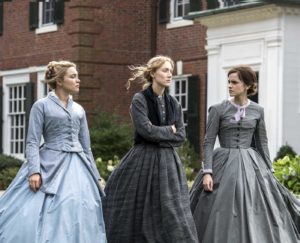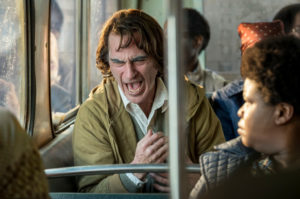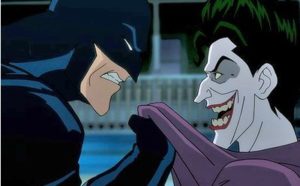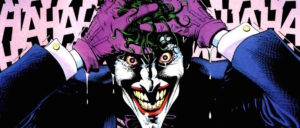







It will do no good to say, as we tend to do every year at about this time, that there are far more important things to think about than the damn Oscars. Of course there are. There always will be. The hum of impeachment hearings in the background as I’m writing this blog keeps pulling my attention away from such burning issues as whether Once Upon a Time…in Hollywood is better than Jackie Brown (not quite) or whether Charlize Theron’s impersonation of Megyn Kelly is as scary or as bravura as Renee Zellweger’s of Judy Garland. (A hard “yes.”) But here I am asking myself these questions anyway and you know why, don’t you? Because you can be entertained by senate hearings for only so long and we go to the gauze of Oscar because we need escape hatches from solemnity.
The troublesome part comes in gauging whether the media industrial complex now cares more about the Academy Awards than movies. Moving pictures come and go through whatever delivery system we can imagine and we still wont know for another ten years which of these movies will last, or what we’ll even mean when we talk about movies in 2030. I am sure that no one will remember or care who wins what in a couple weeks because none of you (I bet) will remember who won what a year ago.
I do know this: a borderline-exceptional year for movies yielded, as I wrote someplace else, one of the least exceptional list of Academy Award nominations in years. Not that the movies themselves are bad. Quite the contrary. But this was a year so filled with quality pictures that the Academy could have taken more chances, nominated less-expected-but-just-as-worthy movies and actors. We can delve deeper into the MIAs as we always do: with a For Whatever It’s Worth (FWIW) blurb, whenever and wherever applicable.
The competition, as depicted below, is pretty much coated with chalk; in sports terms, this means prohibitive favorites with apparently unimpeded rides to victory, especially in the acting categories…maybe.
What I’m also sensing from this year’s assortment is a (somewhat) reactionary bent from an academy that may have gotten (somewhat) fed up with the hoops it’s had to leap through over the previous decade on matters of diversity, independent films and streaming services. If there were a comic-book superhero movie successful enough to be worth the trouble, members might not only have nominated it, but given it several key awards just to spite the cinema snobs.
Oh wait. There is, in fact, a comic-book supervillain movie showing signs of doing exactly that on the evening of February 9th.
Zounds! That means this thing is bearing down on us harder than usual this season. So why wait any longer to get to the picks? The future, in more ways than one, is now.
Best Picture:
Ford v Ferrari
The Irishman
JoJo Rabbit
Joker
Little Women
Marriage Story
x-1917
Once Upon a Time in Hollywood
Parasite
Director:
Martin Scorsese The Irishman
Todd Phillips, Joker
Sam Mendes, 1917
Quentin Tarantino, Once Upon a Time in Hollywood
x-Bong Joon Ho, Parasite
The Irishman looked like an early favorite heading into the season. But the suspicion here is that, as with Marriage Story, there’s just too damn much Netflix around this stuff for movie traditionalists to come to terms with. Roma had the same problem last year, along with English subtitles. This latter aspect would seem to disqualify Parasite, though its overall popularity is far broader than Roma’s ever was. Something tells me that, of all the rest, 1917 is exactly what we think of when we think of “Oscar bait.” It has all the elements: a big-screen narrative far more suited to theatrical than living-room viewing; technical virtuosity in service to a grandly mounted tribute to The Human Spirit (plus it’s a truly absorbing ride); and it has Sam Mendes, who carries the kind of cachet of Serious Adult Film Director that Fred Zinnemann, William Wyler or David Lean used to carry into battles for Oscar, even though I happen to think he’s closer to Zinnemann than to the other two. That Mendes already has one of these (2000 for American Beauty) won’t necessarily keep him from getting another. Lately, however, the splits between best film and best director have happened more often than they used to, and Parasite has connected so hard and deep with all kinds of audiences living life in the 21st century’s global economy that it’s not inconceivable that its director will be honored individually for it, along with the all-but-inevitable Oscar the movie will receive for what they’re now calling “International Feature Film.”
FWIW: Just for the record, my favorite movie of 2019 was The Last Black Man in San Francisco, which is the very antithesis of whatever “Oscar bait” means. I also would have been OK with The Irishman or Once Upon a Time…in Hollywood winning the top prize. But those two, I think, were made for the longer haul of historic debate, not for Oscar’s ultimate approbation.
Lead Actor:
Antonio Banderas, Pain and Glory
Leonardo DiCaprio, Once Upon a Time in Hollywood
Adam Driver, Marriage Story
x-Joaquin Phoenix, Joker
Jonathan Pryce, The Two Popes

Phoenix has specialized in desperate, marginalized men driven to erratic, often explosive (mis)behavior. He once played somebody with those traits named “Joaquin Phoenix” who showed up on David Letterman’s couch seemingly intent on setting his career on fire. Here he’s perceived as having gone “all out” with this persona and there’s nothing Hollywood likes better than honoring performances perceived as being “all out” as opposed to just “out there.” It will do no good to maintain that he was better in Inherent Vice or even The Master because those characters just, you know, bothered people. As God’s Lonely Guy who became Batman’s nemesis, he’s made marginalization palatable, even tamer, by ramping up the pathos and making The Joker (or is it now just “Joker”?) a surrogate for all those who feel left out. Which is no small achievement – and destined for the Academy’s enshrinement.
FWIW: Of course, I preferred the quieter and thus more unsettling alienation afflicting Banderas’ aging artist in Pain and Glory. And however much I became annoyed with Driver’s younger, more mercurial artist in Marriage Story, I believed him to be much more an embodiment of the present-day zeitgeist than Phoenix’s prancing sociopath. But I’d much rather talk about Eddie Murphy’s noticeable absence from this list. What happened? Was Murphy’s Rudy Ray Moore not outrageous enough? Or would the Academy have been more wowed if he’d done his own spin on Moore’s Dolemite character? Maybe there simply wasn’t enough room for Murphy – or, it would seem, for anything else connected with Dolemite is My Name, which may not have been the year’s best, but was a better and more revelatory movie than Green Book. And while I understand Adam Sandler’s relief over not having to wear a tux for a few more nights, he should have been in this mix for his nitro-powered jitteriness in Uncut Gems.

Lead Actress:
Cynthia Erivo, Harriet
Scarlett Johansson, Marriage Story
Saoirse Ronan, Little Women
Charlize Theron, Bombshell
x-Renee Zelwegger, Judy
As with Phoenix, Zellweger is this year’s exemplar of a performer going “all out,” specifically in an eerily on-point evocation of a stage-and-screen legend in decline. Also as with Phoenix, pathos has a lot to contribute to her big lead — and she does all her own singing, too. It’s such a compelling turn that almost everything else about the movie blurs around it. And this could be a problem for her. She wouldn’t be the first star whose movie ultimately lets her down. (It seems a recurring liability in biopics.) Because of this as well as some shade being thrown on her movie by Garland’s daughter Liza Minnelli, Zellweger’s lead is the one most vulnerable to an upset – though one wonders if a Scarlett Johansson win would be much of an upset. Hers is the performance on this ballot that grows on you the most with its emotional variety and tonal progressions. And the fact that she’s under Academy inspection for another performance in another category could enhance her chances here. Hollywood worships Judy Garland and admires anybody willing to do her justice. But to take a cue from Sally Field, Hollywood likes, really likes Scar-Jo and could show her how much they do in this category – or even in the other one. But we’ll get there soon enough.

UPDATE (2/6) — Forget Marriage Story. Not at all as beloved in L.A. whose residents, I sense, feel somewhat dissed by their depiction. It’s Zelwegger after all.

Supporting Actor:
Tom Hanks, A Beautiful Day in the Neighborhood
Anthony Hopkins, The Two Popes
Al Pacino, The Irishman
Joe Pesci, The Irishman
x-Brad Pitt, Once Upon a Time in Hollywood
I hope Pitt appreciates the magnitude of his competition. All the other guys have won before and been nominated more often. The thing is: Pitt does appreciate it, which is what makes him as lovable among voters as Johansson. Then again, they liked Sylvester Stallone, too and Mark Rylance picked his pocket (deservedly so) four years ago in this category. The same thing could very well happen here as this is the one category where acting chops are given heavier weight than in others. (Pesci or even Hanks could be the beneficiary.) Pitt’s performance, however, is a marvel of subtle grace and containment, verities of terrific screen acting that never – or practically never – are honored by Oscar whenever they surface. I’m still going with Pitt, but I think his triumph here will be a bigger “upset” than most believe.
FWIW: Would Christian Bale or Matt Damon in Ford vs. Ferrari qualify here or for lead actor? Either way, I’d have been happy to see one or both in this board game along with Wesley Snipes in his sneaky-great eccentric turn in Dolemite.
Supporting Actress:
Kathy Bates, Richard Jewell
Laura Dern, Marriage Story
x-Scarlett Johansson, JoJo Rabbit
Florence Pugh, Little Women
Margot Robbie, Bombshell

Dern is Hollywood royalty and Hollywood’s been waiting for an opportunity to reward her years of daring and diligence. Though I think her harder-than-it-looks work in Little Women was what should have landed here, her icy, commanding divorce lawyer is likely very familiar to most Academy voters and the shock of recognition alone could be enough to power her to the winner’s circle.

FWIW: Then again, Johansson’s performance as single mom to a Nazi brat in JoJo Rabbit is, as critics have observed, the luminous soul of the movie and if she doesn’t upset Zellweger in the lead category, she could very well pull it off here. (UPDATE (2/6) — I’m now thinking she will.) As for MIAs, my one-and-only here is Idina Menzel as Adam Sandler’s taking-no-shit-and-giving-negative-fucks wife in Uncut Gems
Adapted Screenplay
The Irishman, Steven Zaillian
JoJo Rabbit, Taika Waititi
Joker, Todd Phillips, Scott Silver
Little Women, Greta Gerwig
The Two Popes, Anthony McCarthy
Here is where the consolation prizes are usually given for those movies otherwise overtaken elsewhere and it’s where I think Irishman avoids getting skunked for the night – though either Joker or JoJo could take it away.
FWIW: The case has been advanced — though not, in my opinion, made – that Gerwig’s interpretation of Louisa May Alcott’s book errs too much on the side of modernist, or even post-modernist thinking, robbing the story of the warmth and magic that has sustained it through several previous adaptations. I can’t believe that the Academy carries similar qualms, but I suppose it’s as good an excuse as any to wave her along. I hope in any case that I’m wrong about this.
UPDATE (2/2) — Whoops! The WGA has spoken and it done fell in love with JoJo. Nobody said a motherin’ word about Irishman or Joker or any of Those People. I’m going with them, though it’s by no means a mortal lock.
Original Screenplay:
Knives Out, Rian Johnson
Marriage Story, Noah Baumbach
1917, Sam Mendes and Krysty Wilson-Cairns
x-Once Upon a Time in Hollywood, Quentin Tarantino
Parasite, Bong Joon-ho, Jin Won Han
Another strong field, and the tendency as always is to go with the dude with the smartest, freshest mouth in the pack. Johnson’s crafty script is a dark horse. But here is yet another opportunity to gauge the degree to which Parasite has become a global phenomenon.
FWIW: OTOH, if 1917 gets this, the night is essentially over.
Animated Feature:
How to Train Your Dragon: The Hidden World
I Lost My Body
xKlaus
Missing Link
Toy Story 4
Jérémy Clapin’s odyssey of a disembodied hand in search of its owner was one of the most original films of any kind this past year. Of course, this means it hasn’t a chance in hell of overtaking Buzz and Woody’s latest adventures. Curiously, though, any of the remaining three contenders could.

UPDATE (1/27) — And if the shockeroo pulled off by the “Annies” the other night is any indication, it looks as though it’s going to be the St. Nick origin story.
Best Documentary Feature:
American Factory, Julia Rieichert, Steven Bognar
The Cave, Feras Fayyad
The Edge of Democracy, Petra Costa
For Sama, Waad Al-Kateab, Edward Watts
x-Honeyland, Tamara Kotevska, Ljubo Stefanov
Despite the Obamas’ enthusiastic endorsement, American Factory likely wont overtake the near-miraculously rendered account of Macedonian beekeepers in conflict over the future of their ancient trade – and in a larger sense, the future of the planet. That it’s also nominated in the category just below speaks to its preeminence.
Best International Feature Film:
Corpus Christi
Honeyland
Les Miserables
Pain and Glory
x-Parasite
Sorry, Maestro Almodóvar. But the South Korean juggernaut, as dark and wild as anything you’ve wrought in the past, is too strong for your masterly elegy to overpower.
FWIW: I was sort of hoping for some love here for Mati Diop’s haunting, allusive Atlantics.
Cinematography:
The Irishman
Joker
The Lighthouse
x-1917
Once Upon a Time in Hollywood
Robert Richardson’s orchestration of sunlight and shadow in Once Upon a Time… is invaluable in achieving a sense of a lost world that almost, but never, was. I’m rooting for him, but guessing that Roger Deakins will repeat a year after his long-denied first-time win.
Original Score:
Joker
Little Women
Marriage Story
1917
Star Wars: The Rise of Skywalker
Some hallowed names – John Williams, Alexandre Desplat, Randy Newman, Thomas Newman – are assembled here and they all showed up and produced big-time. Nevertheless it’s the relative newcomer — Hildur Guðnadóttir – who scores big on her first try.
Original Song:
“I Can’t Let You Throw Yourself Away,” Toy Story 4
x-“I’m Gonna Love Me Again,” Rocketman
“I’m Standing With You,” Breakthrough
“Into the Unknown,” Frozen 2
“Stand Up,” Harriet
If anybody is going to beat a drama-laden rouser from the Frozen machine, it’s Sir Elton, who even at or near his dotage can out-rouse anybody who throws down the spangled gauntlet.

The best thing about Joker, as far as I’m concerned, is that it makes Batman: The Killing Joke look far better in retrospect, if only because the latter animated feature from 2016 doesn’t try so hard to be anything other than a longer and more-risqué-than-usual Batman cartoon.
Given all the noise and clatter preceding and following Joker ‘s premiere, the controversy accompanying Killing Joke ‘s release three years ago sounds relatively quaint. It, too, presented a Joker origin story as first conceived by nonpareil comics writer Alan Moore in a 1988 graphic novel. As some of you may recall, the Joker was, as with the guy in the new movie, a struggling comedian. Only here, he’s got a pregnant wife and no prospects. So in desperate search for scratch, he agrees to aid and abet an attempted heist at a chemical plant only to be disfigured and, thus, deranged from falling into a huge vat of toxic glop.

Which turned out to nowhere near as interesting as what happened in the same movie to Batgirl, who ends up shot and paralyzed for life by the Joker, but not before a separate subplot during which she and Batman…Oh boy, do I want to spoil it for you! (Maybe I already have.) But some shocks to the system are most productively sustained in direct encounter.


Needless to say, fan boys and fan girls of all ages were scandalized, screeching, “How dare you heartless pigs do all this to Barbara Gordon?” They were likely remembering all the good times they had back in the nineties when the original Batman animated series was humming along as (since I have the floor and whether anybody cares to argue with me or not) the finest iteration of these characters on ANY sized screen.
There were also many critics who wondered whether the world really needed an R-rated animated action feature. But even if Killing Joke’s animation wasn’t exactly groundbreaking, the film was about as pure a noir product as any black-and-white early 1950s thriller with Lisabeth Scott and/or Glenn Ford. The storytelling was lean and measured, the dialogue was crisp and juicy and the vocal work was superb, most especially by Mark Hamill, whose rasping and cackling as the Joker over three decades of Batman cartoons showed more engagement, invention and audacity than anything he’s done as a on-screen actor.

Better than Joaquin Phoenix? Maybe…And so here we go…

Yes, Phoenix is brilliant in Joker, a bony wraith with hooded eyes and a heart so broken that its fragments seem to poke out of his spine. But it’s a lot of trouble to go to for a character we have no reason to connect with emotionally. Taxi Driver’s Travis Bickle was no better, the movie’s defenders insist. But Robert De Niro’s Travis had just enough charm at the outset to at least make Cybill Shepherd’s campaign worker agree to a date, even if that date was a fiasco. The movie gives neither Phoenix nor us any escape valve, any outlet for irony, wit or joy save for a few precious seconds when Phoenix’s Arthur Fleck joins an audience of entitled swells in laughing at Chapin’s blindfolded roller skating in Modern Times, a glimmer of footage evoking almost everything the movie either forgot or omitted.
Joker isn’t a movie so much as a giant boulder in the middle of Culture Gulch that’s too big to move or ignore. I suppose that’s why there’s been something about the Joker in every New York Times arts section over the last week and a half, at least. This morning’s paper had an article contending the Joker was a case study in thwarted white privilege. Sure. Fine. Whatever. Let’s by all means pump up the rhetoric about Joker being both metaphor and rallying cry for the dispossessed who would rather watch the world burn than engage in any rational effort to save it. The conceit lasts for as long as one forgets how yellow and frayed comic book pages can get over time and how fragile a vehicle they are, ultimately, for the most complex of societal dilemmas.
Still, there’s one aspect of Trump-ism I found in Joker that I haven’t yet found in any review or analysis, though it’s possible I may have missed it. The Gotham City depicted in the film looks most like a doppelganger for the New York City of the seventies with its graffiti-covered subway cars, its rampant street crime, its grimy, cluttered and combustible architecture. It has always struck me that at the core of so much of the president’s rhetoric and, for that matter, the Fox News Channel patter that both feeds and feeds off it is a perverse nostalgia for those Drop-Dead years of the Imperial City, when the hopes and dreams of reformers literally went up in smoke, white flight was at its peak and stigmatizing people-of-color for being the sole agents of their own desperate circumstances was used as fuel for a slow-building mad-as-hell conservative resurgence in the eighties. The Trumpeteers may not have dug the seventies — except for the way those years of squalor and decline made it so much easier for them to hate the sixties.
I realize that by bringing all this up that I’m adding to the same overestimation of Joker’s significance that I’m criticizing. My pallid excuse is that I’m only going along with the rest of the culture – and with the movie itself. I need to stop it here before it gets worse.

So I’m going to end this the way Killing Joke ends: with both Batman and Joker, mortal enemies and mirror images of each other’s obsessed, damaged souls, laughing together at the same dumb joke. It may not have the grandeur and oomph of Joker’s windup. But as with much else about that full-length Batman cartoon, it makes for a much more satisfying and logical conclusion – or do I mean punch line?
“SEYMOUR MOVIES” was the title of my long-lost weekly TV review block for WPIX-TV. (Hey, guys. How’s it going up there? Miss you much.) It’s re-invented here as a new blog feature that won’t run as regularly. Another installment will follow this one soon. Promise.
The Master — (IMMEDIATE REACTION: I don’t care how great a filmmaker Paul Thomas Anderson is; I am never going to his house to watch sports with his friends if they’re all like his main characters.)
If I ran a repertory movie house, I’d set up a double feature with Terence Malick’s The Thin Red Line leading off and Paul Thomas Anderson’s The Master as its companion piece. I’ll bet you they’d flow so seamlessly into each other that audiences willing to sit through the whole program would swear they were the same strange movie. And I would bill the double-feature, for either Veterans Day or Memorial Day, under the general rubric: “The Greatest Generation: Approach With Caution.” Here’s another one: “War is Hell and So Are Other People.”
You’re never allowed to know the specific kind of trouble Freddie Quell (Joaquin Phoenix) has seen during World War II. But you’re free to guess the worst from watching Freddie distilling moonshine from toxic industrial wastes and humping sand-sculptured women. Never mind if he was unhinged before the war; only a rare strain of shellshock (an expression I will always prefer over PTSD) could have caused such a severe case of nervous decompression. .
The protagonists in Anderson’s movies are either highly combustible (Daniel Plainview in There Will Be Blood; Barry Egan in Punch-Drink Love) or highly malleable (Dirk Diggler in Boogie Nights; almost everybody in Magnolia). Freddie carries both these extremes into the only place where someone like him could find comfort and release: a pseudo-scientific, quasi-mystical cult whose leader (Philip Seymour Hoffman) fills in the dark, empty spaces in Freddie’s soul. Not even this outfit can meet his amorphous needs – and the movie’s bleak theme may be that nothing can.
It’s a forbidding takeaway and the movie’s frosty, near-clinical diagnosis of such angst won’t win your heart. Phoenix, improbably, almost does in the way that an injured wolf, however much he snarls and tears at you, can subdue your resistance with its whimpering. As unnerving as Freddy is, you come away worrying about his future. I’m also kind of worried about Anderson’s. The Master can only enhance his long-term prospects for moviemaking immortality. But it leaves you wondering how hard he’ll press his ongoing inquiry into the nature of need. Addiction itself can only be his next logical subject and it’s more than a little scary to wonder how he’ll frame that discussion.
Argo – (IMMEDIATE REACTION: Is Bryan Cranston the greatest American actor?)
The tight spaces of Argo’s narrative and settings don’t give Ben Affleck the kind of room he had in both 2007’s Gone Baby Gone and 2010’s The Town to show his facility as a director with gritty atmosphere and smoldering passion. If anything, Argo’s account of how six American foreign service workers were extracted from post-revolutionary Iran by posing as a Canadian film crew seems more like a calling card for Affleck’s potential television work in case the feature-film thing doesn’t work out.
This movie’s success with critics and audiences so far seems to assure Affleck of more chances at the helm, even if his performance as CIA operative Tony Mendez, the escape plan’s mastermind, seems contained to a fault. But then, containment seems to be the movie’s prevailing motif. The decision to shoot every character, even Kyle Chandler’s perfectly puffy rendition of Carter chief-of-staff Hamilton Jordan, as if each was in a box too small to hold them works to the movie’s advantage by boxing in or, maybe more accurately, bottling up your dread and anticipation throughout. There would be no purpose in making a movie like Argo unless you can make your audiences worry how the story’s going to turn out – even when they can easily research the outcome before they buy tickets.
So far, the only actor here who seems to be getting anything resembling Oscar buzz (Really? Already?) is Alan Arkin as the brash-but-soft-hearted movie mogul who cooperates with the Agency by selling the idea of a fake Star Wars rip-off. Arkin’s fine and John Goodman, as the droll makeup artist who serves as middleman between the spooks and the suits, is even better. But you’ve seen them do their respective shtick before, however effectively mounted here. The performance that most conspicuously breaks through the tightly-wound story line belongs to the increasingly legendary Bryan Cranston, who is yet again playing a character with warring intentions, though there’s no reason to place his harried Agency middle-manager Jack O’Donnell in the same clinic with Walter White, the self-justifying sociopath Cranston’s made immortal on AMC’s Breaking Bad. It would be easy for most actors to play O’Donnell at a single high pitch as he’s pushed around by those above and below his GS level. Somehow, Cranston makes O’Donnell’s passage from skeptical boss to harried controller to steely improviser seem recognizable to anyone who’s either supervised or been supervised towards an impossible deadline. He seems too well-adjusted to be involved in such abnormal shenanigans, which is precisely what makes him authentic in this welter of quick-change deceit. I doubt such intelligent work will be rewarded with an Academy nomination. Cranston will just have to settle for covert acclaim – at least for the time being.
The Paperboy — (IMMEDIATE REACTION: So oily and greasy, I could fry a whole chicken in it.)
Books are books and movies are movies and I’ve been acutely aware of the difference since sixth grade when I tried to pawn off a book report of Twenty-Thousand Leagues Under the Sea based solely on the Walt Disney movie version – and, yes, I am still ashamed of myself, thanks for asking. But I’m hearing so many people, even a few I trust, saying Paperboy the movie is the fault of Paperboy the book that I am compelled to pick up my magnifying glass and serrated tweezers to split a few hairs I might have otherwise left alone.
I’m going to fix upon what may be the smallest of these hairs: Yardley Acheman. In Pete Dexter’s book (which, since I have the floor, I will declare one of the two best novels written by my former Philadelphia Daily News confrere while withholding for now the other one’s title), Acheman’s a white journalist who sees himself as a stylistic dandy when compared with his bloodhound colleague Ward James. Despite his own propensity for turning newspaper work into something perilously close to poetry, Pete carries an abiding bias towards hard-working, nose-to-the-ground reporters like Ward over “New Journalism” peacocks such as Yardley and I badly missed that subtext in Lee Daniels’ movie, where subtext along with subtlety has been tossed over the side like so much tainted cargo.
In said movie, Yardley is a black Englishman (David Oyelowo) who’s supposed to be the “word man” on an unnamed Miami newspaper to the “leg man” here re-dubbed Ward Jansen (depicted by Matthew McConaughay with more peacock swagger than one might have expected.) I don’t know why the name change had to happen, but I’m guessing that the novel’s 1965 setting was moved four years ahead in order to make more plausible the idea of a newspaper-reporter-of-color coming to a small Florida town to help prove that a white swamp rat named (as in the book) Hillary Van Wetter (John Cusack) is innocent of murdering a bigoted local lawman.
It’s still not plausible. African-American reporters were barely integrating northern newspapers in 1969, making it more improbable that black tabloid transients were being imported from overseas to juice up New South broadsheets. And they sure as hell weren’t getting jobs as “New Journalists” in New York as Yardley’s supposed to have achieved in the movie. I was looking very hard for black New Journalists in those days because I badly wanted to become one. That’s how I know this is bullshit.
Defenders of both the movie and Daniels shrug at such anachronisms. It’s a vision of the past, O.K.? No one expects Imitation of Life or The Long Hot Summer to be documentaries of their time and place. Word. But whatever you may think of those 1950s melodramas to whose levels of warm moisture and socio-cultural itchiness Daniels’ Paperboy seems to aspire, there’s a spike of emotional truth that cuts through their respective levels of gauziness and muck. This movie’s glib re-jiggering of Yardley’s identity and purpose into a racial-sexual red herring signifies a preference for gaudy effects over the kind of honesty that’s ONLY possible in great melodrama. Someday, assuming Daniels gets more chances to deploy his over-the-top blend of raciness and grotesquerie, there may well be retrospectives devoted to his body-of-work, his – if you will – vision. I may even be around to bear witness if I choose to. I will find something else to do.
Oh, yeah. Don’t know if you’ve heard but Nicole Kidman pees all over Zac Efron’s jellyfish bites. Have I ruined it for you? Guess what? That’s not even the grossest thing you’ll see.





















